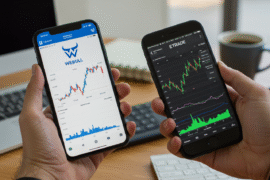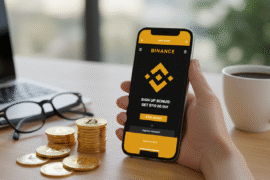This article may contain references to products or services from one or more of our advertisers or partners. We may receive compensation when you click on links to those products or services. Nonetheless, our opinions are our own.

Updated by Albert Fang
Cryptocurrencies like Bitcoin, Etherum, etc. have been heavily in the news since the start of 2021. They are seriously being considered as a primary mode of the transaction by many businesses and high-powered individuals like Elon Musk. Many investors are also considering cryptocurrencies and blockchain technology as an investment option because of their high-rewarding nature.
This changing customer behavior and perspective towards blockchain technology and cryptocurrency can be seen translating into their market values. The global blockchain technology market value is estimated to go up to $23 billion by 2023 and that of cryptocurrency will reach $1087.7 million by 2026.
Bitcoin itself has gained 193,639.36% between 2012 and 2020. Even the world’s top asset, Gold, hasn’t performed so exceedingly, ever. Here’s a chart to give you perspective on how fast and drastically Bitcoin and other cryptocurrencies have grown in comparison to other well-established assets like Gold.
[Source: Woobull]
Here’s what your $1 would’ve been worth if you had invested in Bitcoin vs Gold: Bitcoin: $43,453,700.00 | Gold:$1.74.
Since the applications, use cases, and acceptance of cryptocurrencies are increasing, we are seeing a usage surge in digital wallets (e-wallets) to store cryptocurrencies and other digital assets. This market is estimated to reach the $154.1 billion mark by 2025. According to this Financial Express article, it is, in fact, the second most popular method of payment in-store as well.
But there’s not much concrete understanding of what, why, and how to use digital wallets which is what we are going to explore in this article. Here’s a quick overview of what we’ve covered in the article:
- What is a Digital Wallet? – An Overview
- Digital Wallets – The Workings
- Types of Digital Wallets
- How to Use Digital Wallets for Cryptocurrency
- Best Cryptocurrency Wallets of 2021
- Are Digital Wallets the Future of Money?
What is a Digital Wallet? – An Overview
Digital Wallet or e-Wallet can be defined as a software-based system, or an electronic device, or an online service that securely stores users’ payment information, passwords, funds, and more for various payment methods and websites. The main purpose of digital wallets is to enable individuals and businesses to make transactions electronically.
These wallets can be integrated with mobile payment systems which will allow users to transact using their smartphones.
Cryptocurrencies don’t exist in any physical shape and form and hence the best and secure way to store, use, and track them is through digital wallets. Crypto wallets don’t just allow their users to store cryptocurrencies, but they also allow the users to purchase, sell, and transfer these currencies.
Digital Wallets – The Working
A digital wallet is essentially software that can be accessed through a smartphone app, desktop application, or other formats of physical devices. By far, the smartphone digital wallet apps are the most popular because of their flexibility and mobility.
To create your digital wallet using a smartphone, all you have to do is download an app, register yourself on the platform after verification via email or OTP, and connect your assets and bank accounts. Usually, these digital wallet apps are created by banks or trusted third parties. Always make sure of the authenticity of the app since the information you’ll be storing is quite sensitive and personal.
These apps are usually protected via passwords or biometrics like Touch ID or Face ID which means only the owner of the smartphone can access their wealth and assets stored in their digital wallets.
The popularity of digital wallets is constantly on the rise because of the ease and convenience of transactions and the fact that they are far more secure than physical wallets. They’ve literally made physical wallets almost obsolete. And from a company’s or bank’s perspective, these digital wallets have made it effortless for them to collect, track, and measure their consumers’ data and purchasing habits.
Types of Digital Wallets
There are three types of digital wallets based on who can use them and how they can use them.
- Closed Wallets – Closed wallets are created by a particular company with a limited scope of usage for their users. The users can store their funds and make transactions but only with the issuer of the wallet. Classic examples of closed wallets are Makemytrip.com and Flipkart.com that allow their users to add money to their wallets which can only be used for their offerings.
- Semi-closed Wallets – Semi-closed wallets are a little more flexible than closed wallets but they are still limited to transactions between their users and the listed merchants and approved locations. Paytm is a classic example of a semi-closed wallet but with its wide network of merchants, they are able to provide their users with the flexibility of an open wallet.
- Open Wallets – Open wallets are usually issued by banks or financial institutions. They are capable of everything a semi-closed wallet is and also include functions like withdrawal of money from banks and ATMs.
These digital wallets can be further divided into 5 categories when it comes to cryptocurrencies.
- Hardware wallets – one of the safest ways to store your crypto and they are also known as cold storage as they are offline.
- Software wallets – these are software-based wallets and are also called hot wallets as they are hosted online.
- Mobile phone wallets – these are app-based wallets and are the most popular among the people trading in crypto.
- Web wallets – these wallets aren’t as secure and used as temporary storage when moving crypto from one place to another.
- Paper wallets – are among the safest options for cryptocurrency as they hold your cryptocurrency offline.
To get an in-depth understanding of these wallets, you can read Bitdegree’s article on the same topic.
How to Use Digital Wallets for Cryptocurrency
Digital wallets are quite simple and easy to use. All you have to do is choose a platform you trust, create your account using personal information, add a secure password, and that’s it. To make it more secure, it is recommended to opt for 2-factor verification (2FA) which will send an OTP to your registered number every time you make a transaction using the digital wallet.
Once you are all set up, then you can carry out transactions with the merchants that accept cryptocurrency. The transaction can happen between your wallet and a POS or between two digital wallets based on the merchant and their chosen mode of transaction.
Best Cryptocurrency Wallets of 2021
- Coinbase: It allows users to buy, sell, trade, and store digital currencies including cryptocurrency. The users can easily buy and sell currencies and keep track of all the trades in the app. They also enable their users to schedule currency trading on a daily, weekly, or monthly basis. This platform is accessible in more than 100 countries.
- Binance: Around 150 cryptocurrencies are available on this platform for the users to trade-in. It is one of the most preferred platforms for trading Bitcoin. They offer a wide range of tools, are secured, and offer 24/7 support to their users.
- Trezor: It is a hardware wallet that allows you to store your bitcoins securely and also lets you easily access them by plugging Trezor into a smartphone or a computer. It supports over 1000 cryptocurrencies and is ultra-secure storage for them.
- Coinmama – This platform allows its users to easily buy cryptocurrencies within a stipulated limit using their debit or credit cards. It is among the best platforms to trade in cryptocurrencies with the fastest account verification.
- Paxful Wallet – This one is perfect for beginners and people who aren’t too well accustomed to technology like veterans. It’s a peer-to-peer marketplace that allows buying and selling of Bitcoins and 100+ other digital currencies using 300+ payment methods. It allows easy withdrawal and deposit of funds from your bank account and you can also send funds to your PayPal account.
For more crypto exchange options, read this in-depth article on Best Crypto Exchanges.
Are Digital Wallets the Future of Money?
Physical wallets are on the verge of extinction as mobile payment wallets continue to make their mark as the preferred payment method because of their convenience, security, and speed of transacting. Moreover, they can store multiple payment methods and allow access from multiple touchpoints like smartphone, smartwatch, or a tablet.
They are also creating an inclusive ecosystem of money for the users and merchants as the users are able to spend their money in-store and online easily.
There are some concerns around the safety of such wallets especially when it comes to cryptocurrency wallets but they are actually more secure than physical wallets which are prone to accidental cash loss. These wallets actually give the owners private access to their funds using authentication methods like inputting passwords and face ID which makes them more secure than carrying around actual cash.
Consumers, merchants, and banks are definitely embracing this wave of digital wallets, cryptocurrencies, and blockchain technology which is essentially leading us towards the democratized future of money.
Because of the inclusive nature of digital currencies and wallets, they are definitely going to be a big part of the financial ecosystem of the future.

Reviewed and edited by Albert Fang.
See a typo or want to suggest an edit/revision to the content? Use the contact us form to provide feedback.
At FangWallet, we value editorial integrity and open collaboration in curating quality content for readers to enjoy. Much appreciated for the assist.
Did you like our article and find it insightful? We encourage sharing the article link with family and friends to benefit as well - better yet, sharing on social media. Thank you for the support! 🍉
Article Title: Ultimate Guide to Digital Wallets to Store Cryptocurrencies Securely in 2023
https://fangwallet.com/2021/07/20/ultimate-guide-to-digital-wallets-to-store-cryptocurrencies-securely-in-2021/The FangWallet Promise
FangWallet is an editorially independent resource - founded on breaking down challenging financial concepts for anyone to understand since 2014. While we adhere to editorial integrity, note that this post may contain references to products from our partners.
The FangWallet promise is always to have your best interest in mind and be transparent and honest about the financial picture.
Become an Insider

Subscribe to get a free daily budget planner printable to help get your money on track!
Make passive money the right way. No spam.
Editorial Disclaimer: The editorial content on this page is not provided by any of the companies mentioned. The opinions expressed here are the author's alone.
The content of this website is for informational purposes only and does not represent investment advice, or an offer or solicitation to buy or sell any security, investment, or product. Investors are encouraged to do their own due diligence, and, if necessary, consult professional advising before making any investment decisions. Investing involves a high degree of risk, and financial losses may occur including the potential loss of principal.
Source Citation References:
+ Inspo











































